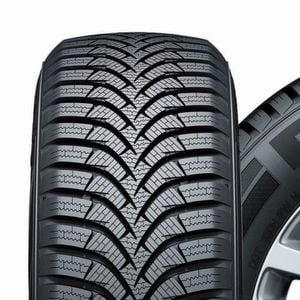Last Updated on 15.11.2024 by hrushetskyy

Our expert explains the causes of tire squeal when turning corners and offers practical solutions to improve your ride.
Tire Squeal When Turning Corners? Fix It With These Best Expert Tips
Tires squeal as rubber scrubs off while trying to find traction during hard braking, cornering, or accelerating. You might hear this sound even during gentle turns if the issue is severe.
However, if you notice squealing when maneuvering in a parking lot—especially on newly painted surfaces—it’s often not a cause for concern. The sticky surface and tight-radius turns at low speeds can produce a squeaky, shoe-like sound.
Many drivers wonder, “Why do my tires squeal?” when they hear these noises during slow turns. In this post, our mechanic lists all the main causes of tire squeaking and offers solutions to prevent and fix it.
Squealing tires when turning сorners: сommon сauses
Probably one of the most unpleasant “companions” to your ride, a tire squealing noise, can be caused by a number of reasons. Once, my wife had been ignoring it for months. When we finally took her car to the shop, it came out that her shock absorbers were worn out. Don’t repeat her mistake: if you hear any unpleasant noise, visit your mechanic immediately!
Let’s look at what might be causing your tires to squeak and what we, mindful drivers, can do to keep it from happening.
Cause number 1. Underinflated tires
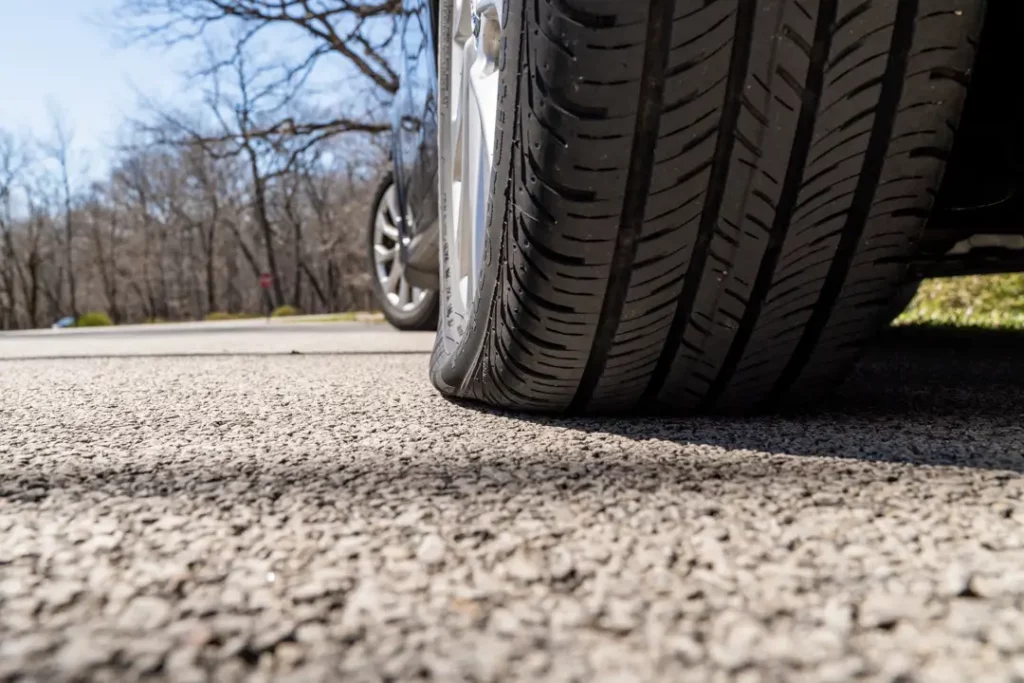
Low pressure in your tires is one reason tires make noise when turning, and there are several causes of an underinflated tire. One of the main ones is when one tire loses more pressure than the others. Low air pressure flattens a tire, making it more vulnerable to damage and causing it to flex excessively, which reduces traction. It must be repaired or replaced ASAP. The lack of proper maintenance is another common cause of underinflation. All tires lose air over time due to the process of osmosis. Visually check the pressure of your tires every time you’re about to drive and use a tire pressure gauge at least every 1,000 miles.
Overinflated tires, on the other hand, decrease contact with the road and can also lead to issues like tire squealing. When turning, there isn’t enough resistance to counter the forces acting on the tire, causing it to slide sideways as it tries to find proper road contact. This rubber sliding results in squealing when cornering.
Regularly checking the air pressure prevents unevenly worn tires, decreases the risk of a blowout or flat tire, and prolongs the tires’ lifespan. The frequency of inspections depends on the roads you drive, the age of your tires, and your driving style.
Cause number 2. Regular and uneven treadwear
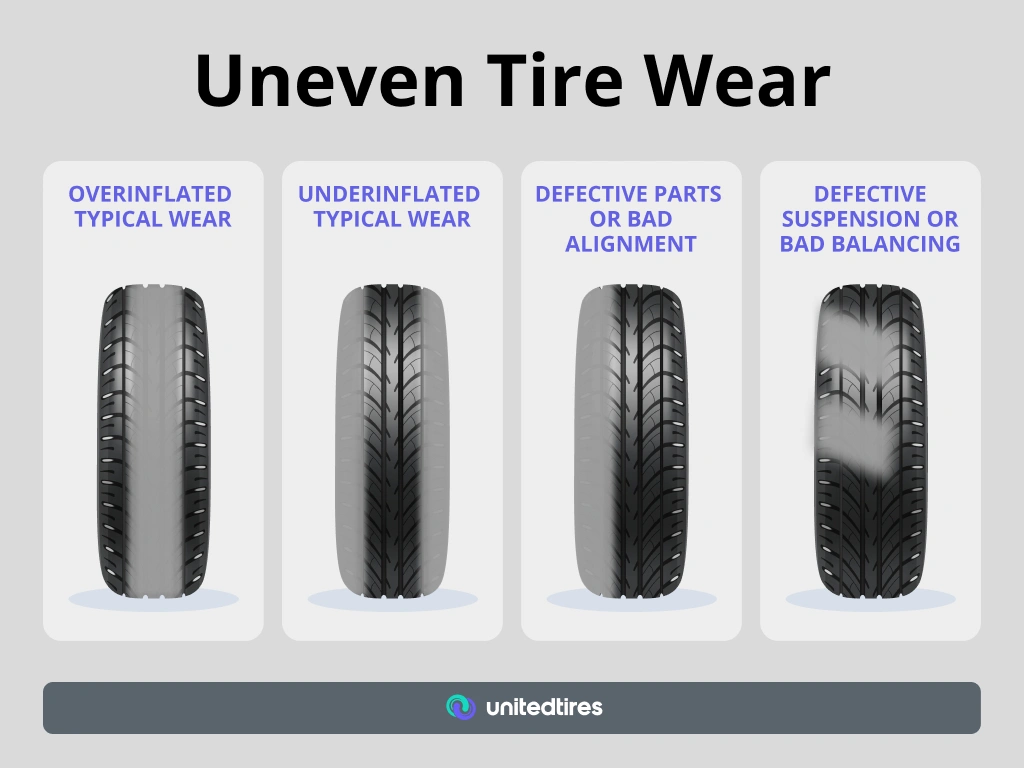
Sufficient tire tread provides enough traction, and the lack of it makes a tire squeak when turning corners. Uneven tread, caused by misalignment in the vehicle’s suspension system, can also lead to squealing and poor driving performance. Tires are legally considered bald and dangerous at 2/32” tread depth. However, traction loss may become noticeable at 5/32”. As your tires reach 4-3/32”, you should start searching for a new set, as your current tires can already be unsafe and noisy.
PRO TIP: Along with top-tier brands, consider affordable options from reputable manufacturers that offer quality tires, such as Milestar Tire, Solar, Nexen, etc.
When tires wear unevenly, they can start to squeal sooner than expected. In this case, even a 1-2/32” difference in tread depth becomes noticeable. Uneven wear can indicate other issues, like tire misalignment, wheel damage, or suspension wear, which can amplify noise and further impact tire condition.
Inspect your tires regularly to avoid uneven wear. Look at the wear indicator on your tread or perform a simple penny test. Check the balance of the tires, wheel alignment, tire pressure, suspension and wheel condition, etc. Also, don’t forget to rotate tires to achieve even weight distribution within the set.
Cause number 3. Wheel misalignment
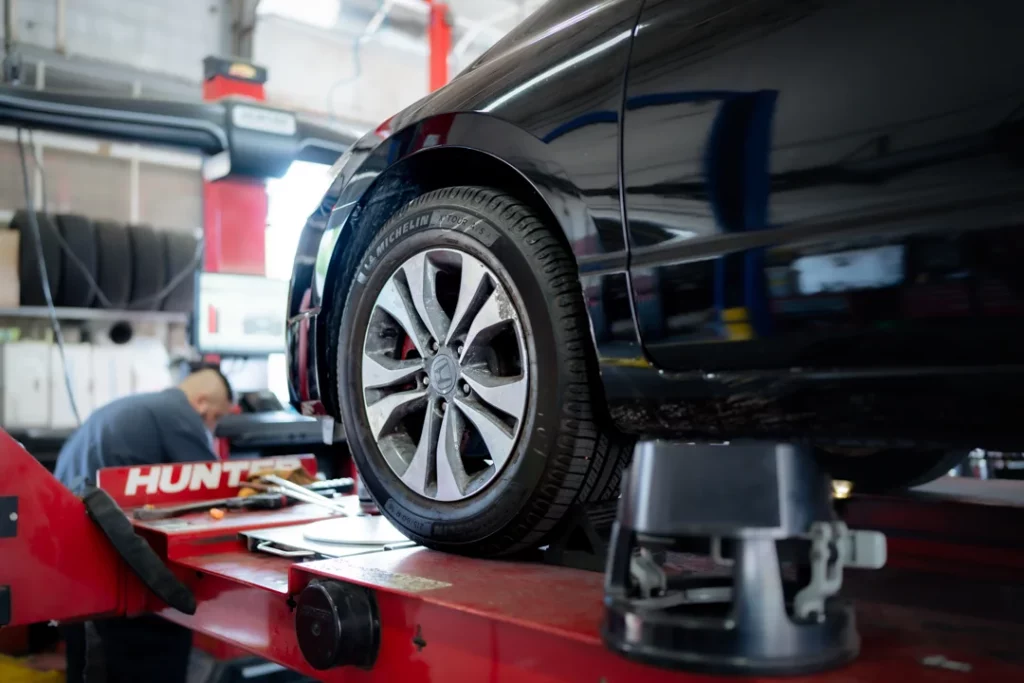
During a wheel alignment, camber and toe settings determine the position of the wheels relative to the ground and each other. When these settings are off, tires may wear unevenly and lose proper contact with the road, potentially causing a noise.
Misalignment can also occur from hitting a large curb or pothole, which can misplace the suspension. It can also happen if a mechanic improperly handles tire rotation or installs new wheels or suspension.
NOTE: Wheel alignment and tire balancing—two terms that often get mixed up! Alignment deals with the positioning of your car’s suspension, making sure the wheels are set at the correct angles, while balancing focuses on distributing the tire’s weight evenly for a smoother ride.
Non-tire-related issues
Non-tire-related issues that may cause squealing include:
Damaged belt
If the tire squealing increases with speed, the engine belt might be worn out or damaged. This could result in a malfunctioning power steering pump. You can easily identify it by an unusually heavy steering wheel.
Faulty wheel bearing
Worn or faulty bearings can create friction that causes a squealing sound. Bearings act as cushions between the axle and the wheel. If you don’t replace them in time, it can lead to grinding noises and accelerated wear of nearby components due to increased vibration.
Dry steering/suspension element
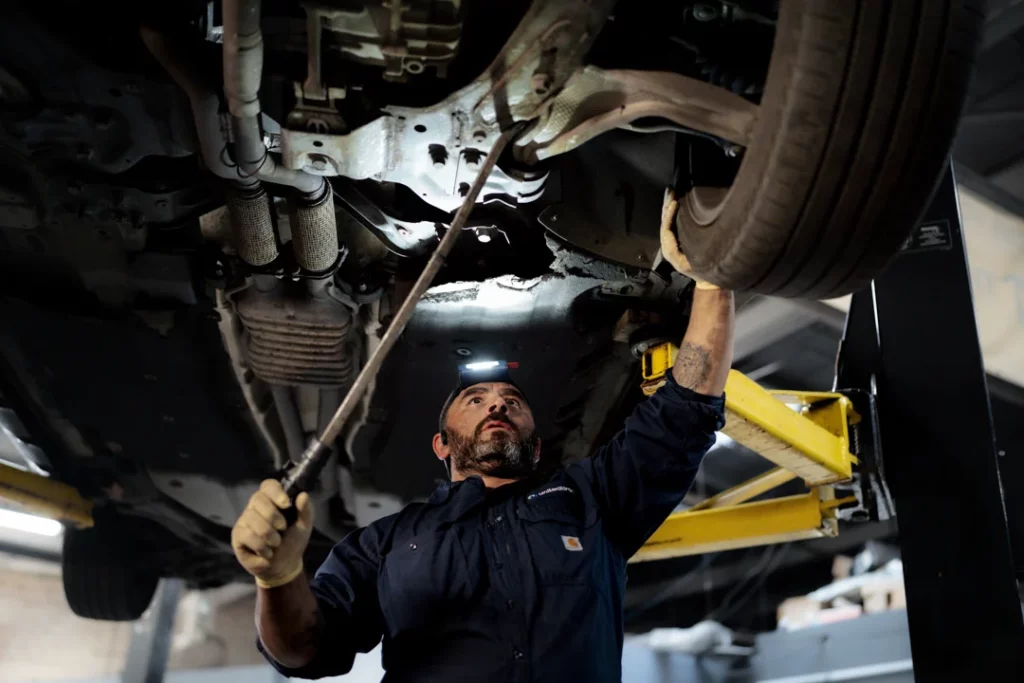
If steering or suspension components need lubrication, they can produce sounds similar to tire squealing when turning. Components such as tie-rod ends, ball joints, seals, bushings, and bearings are often the culprits.
Loose wheel
Loose wheel lugs or covers can cause friction between the tire and the wheel surface, leading to squealing noises when turning. Wheels can also become loose after hitting road hazards. Or if an inexperienced mechanic did poor work while mounting your wheels.
Worn brakes
Squealing or squeaking sounds can also result from metal-to-metal friction in the brakes, often due to worn-out brake pads. Check the brake pad wear indicator to see if the noise comes from the brakes.
Low-power steering fluid
A lack of power steering fluid can cause squealing when turning the wheel. Check for a power steering fluid leak, usually marked by pink or red stains.
Factors that can trigger tire squeal
Road conditions
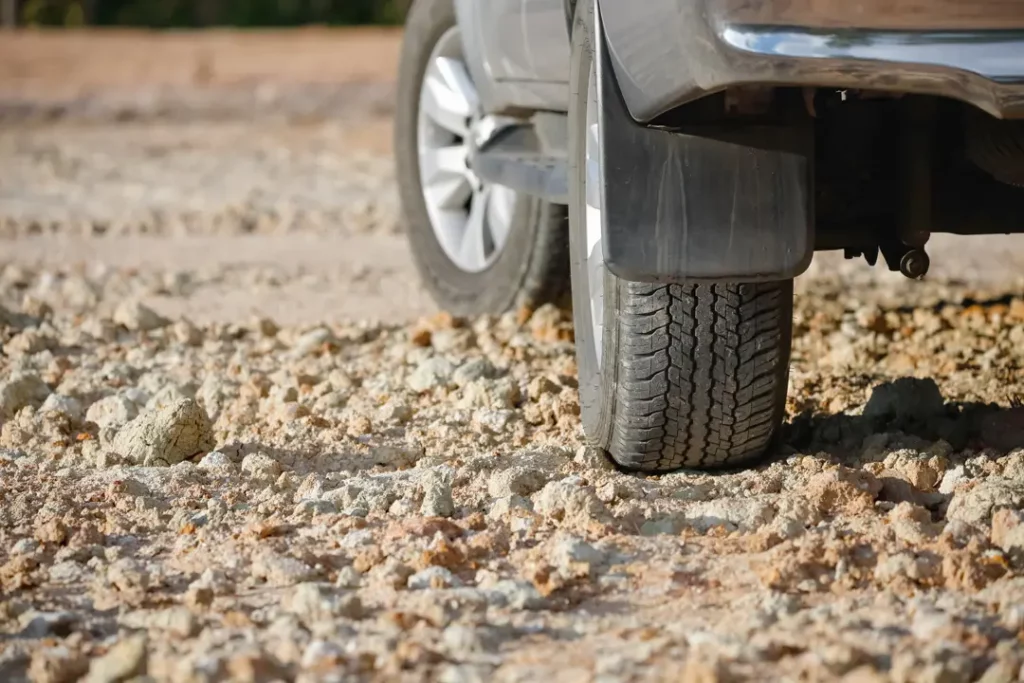
Tires struggle to maintain traction on roads covered with debris like gravel or sand, causing vibrations and squealing noises. Winding roads with frequent curves or turns—especially at higher speeds—is another condition that can make tires squeal. In this case, they quickly grip and release the road surface due to constant direction changes.
Driving speed and style
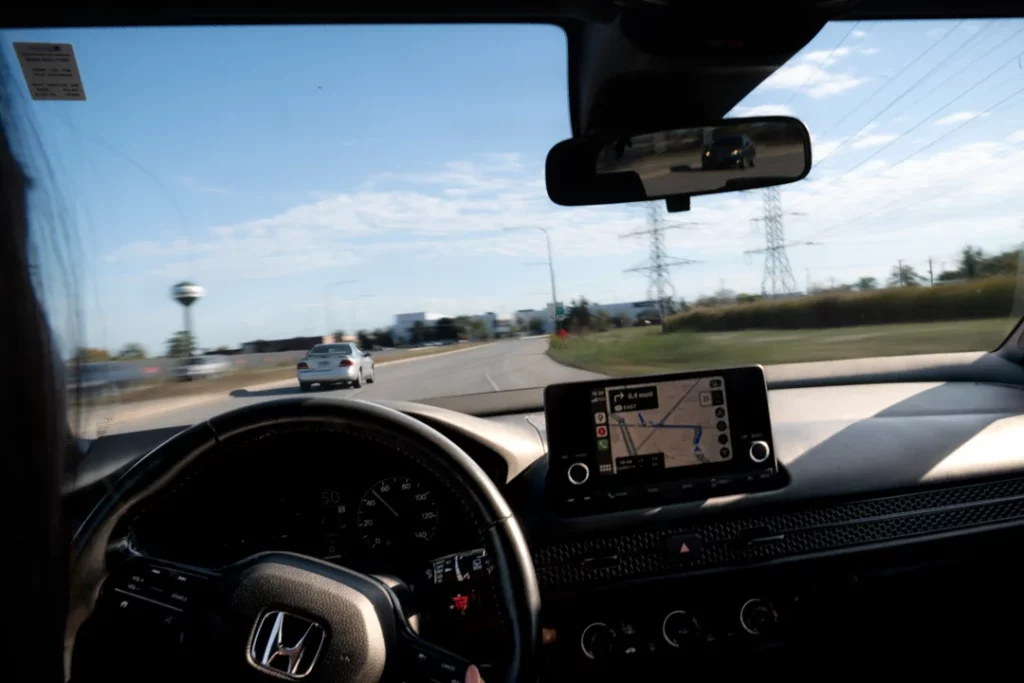
Your driving speed and style definitely contribute to tire squealing. High-speed driving, especially during cornering or braking, can cause tires to momentarily lose traction, resulting in squealing. Aggressive habits like rapid acceleration or hard braking amplify the effect; quick acceleration makes tires spin faster than they can grip, while hard braking causes slight skidding, both leading to squealing sounds. Driving with a heavy load or towing a trailer puts extra stress on the tires. They struggle to maintain proper road contact and can squeal.
If your tires squeal, deal with it ASAP
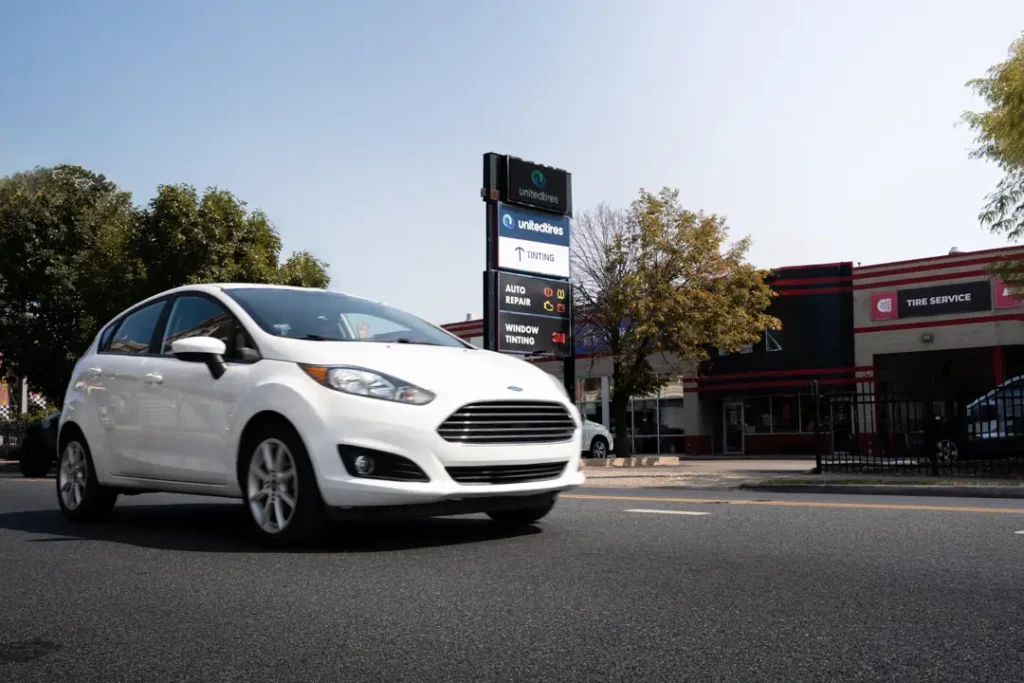
Squealing tires are often an early warning of deeper issues, like uneven tire wear or brake problems, that could eventually impact your car’s control. Don’t ignore these sounds—they could hint at tire, wheel, or brake system damage waiting to get worse!
Driving with squealing tires increases the risk of a tire blowout, which can be catastrophic, particularly at high speeds. When you hear any noises, take your car to a trustworthy mechanic! If you are in the Chicago area, welcome to one of our conveniently located shops at 2720 W Grand Avenue or 3616 N Harlem Avenue, and our technicians will check your car and tires on high-end equipment.
Tire squeal when turning corners: solutions
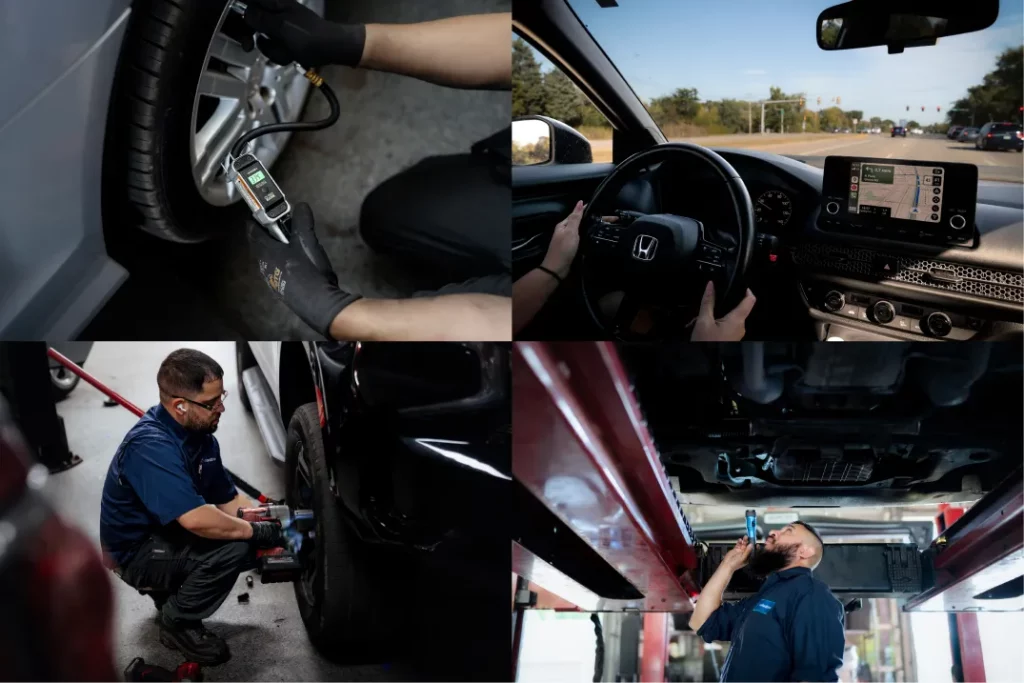
Eliminating all possible causes of tire squealing include:
- Regular pressure checks
- Driving habits control
- Proper tire maintenance routine
- Proper vehicle maintenance routine
Regular pressure checks
Car air pressure is one of the most important potential issues to monitor: it can be easily lost. One nail in the tire can cause an air leak, often going unnoticed until it’s too late. Driving on is considered unsafe if a tire is deflated by 25%. In fact, the risk of a tire-related crash increases threefold in this scenario.
For a standard lightweight tire with a recommended pressure of 30 psi, a 25% drop equals 7.5 psi. A tire with a leak can lose up to 3 psi per day without blowing out, meaning after just two days, the tire may already be unfit for use—far more dangerous than simply hearing the tire squeal when turning. Even if you re-inflate the tire, hidden damage might still be there. When sidewalls fold repeatedly, they can develop internal cuts, which can eventually lead to a bulge—a clear sign that air is trying to escape through the weakened area.
How do you check tire pressure?
Two ways to check tire air pressure are using a pressure gauge or the tire pressure monitoring system (TPMS).
You can buy a pressure gauge at almost any tire shop for around $5. The TPMS (Tire Pressure Monitoring System) will alert you if there’s an issue. If the pressure drops below 25%, the system will display a warning and indicate which tire has the problem. This system is mandatory in all vehicles manufactured after 2007.
Driving habits control
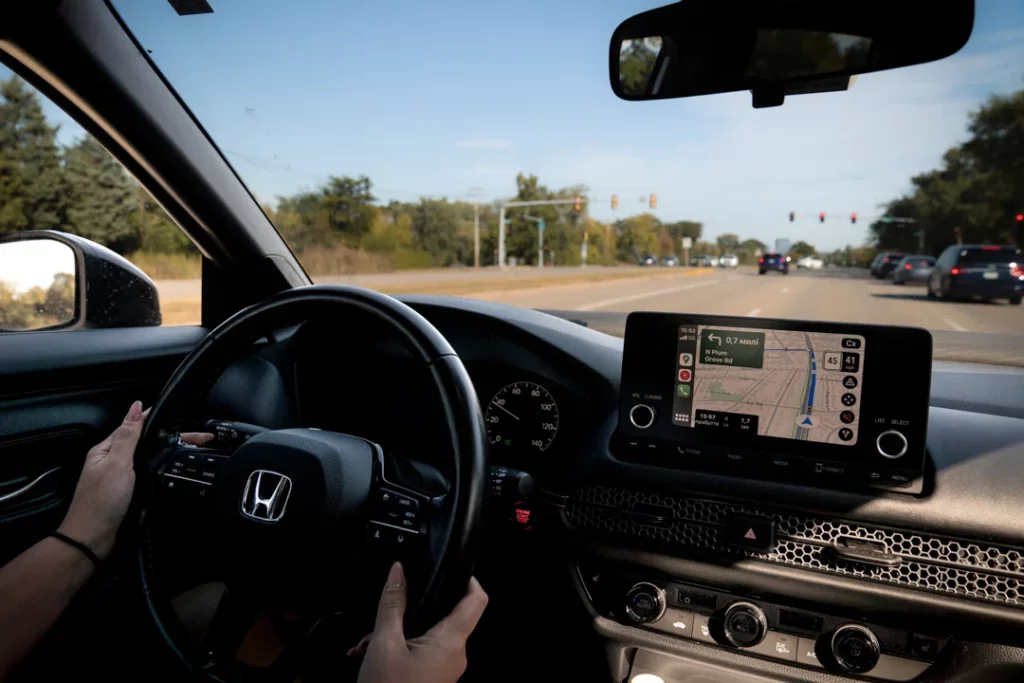
As I’ve already mentioned, ou might hear a tire squeal when turning corners, braking, or during sudden acceleration if your driving habits tend to be on the “aggressive” side. To make sure your steering, suspension, wheels, and tires last longer, try to avoid the following maneuvers:
- Rapid acceleration
When you accelerate quickly, the tires spin faster than they can maintain traction, temporarily losing grip. During this process, some rubber scrubs off the tire, reducing the tread depth and causing a squealing noise. Plus, the tire’s temperature rises rapidly, which can lead to premature aging. - Hard braking
Hard braking produces the same squealing sound and rubber scrub-off but in reverse. The tires stop rotating quickly but continue sliding on the road for a short distance. This can cause severe uneven wear, contributing to further squealing. - Hard cornering
When you take a corner quickly, the tires slip slightly as they work to maintain traction. The difference between the car’s direction and the tires’ grip point at high speeds can cause one or more tires to squeal when turning.
Proper tire maintenance routine
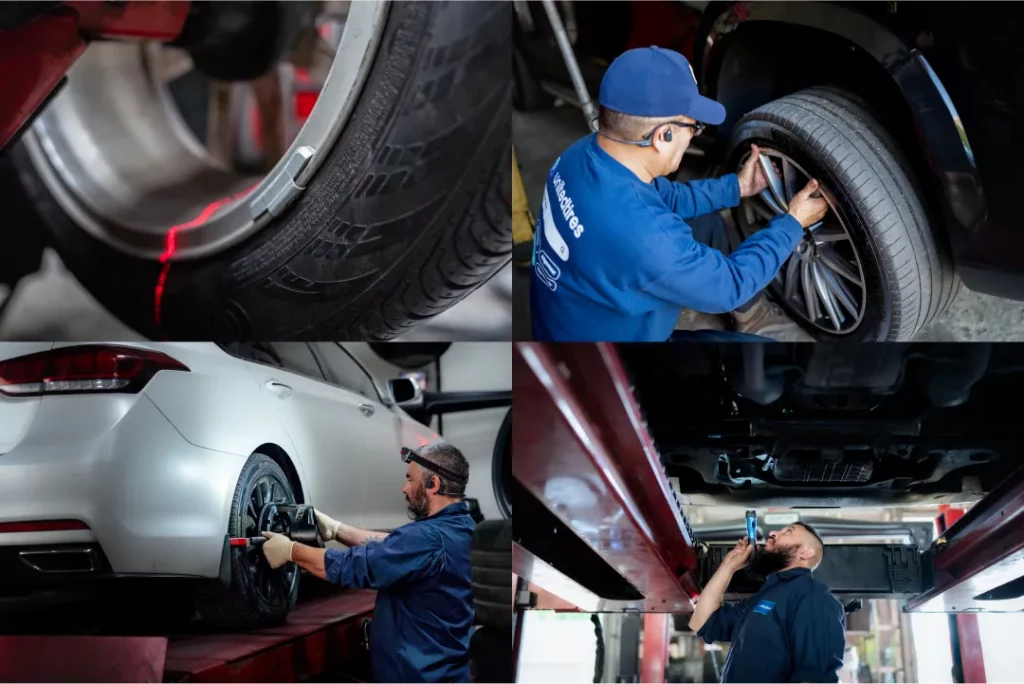
The essential tire maintenance routine consists of:
- Balance checks and balancing
Tire balancing evens the weight distribution within the tire, as small weights are placed on the rim opposite the stiffer rubber spots. Consider tire balancing every 5,000-7,000 miles; it will cost about $6-$20 per tire. - Tire rotation
Tire rotation helps distribute weight evenly on all tires as they are put from side to side, axle to axle. Consider rotating your tires every 5,000-7,000 miles. Depending on the tire shop or dealership, it will cost $25- $120. - Wheel alignment
A wheel alignment adjusts the suspension based on three key angles: camber, caster, and toe. This adapts the wheel position towards the ground, each other, and the steering axis. It’s a good idea to check wheel alignment whenever you inspect your vehicle or replace suspension parts. The cost is typically around $50-$75 for the front wheels, $100-$150 for all four wheels, or about $200 if you opt for a service warranty. - Proper vehicle maintenance routine
Visit an auto shop every six months or annually to have the engine, steering, suspension, and other essential car parts inspected. A vehicle inspection costs about $100.
Some considerations, before you hit the road
Each car component has its own lifespan, and it’s important to be aware of it and ensure timely replacement. For example, shock absorbers last about 4-5 years if the vehicle is regularly used. If you drive carefully, wheel bearings may last 10-15 years (or about 120,000-150,000 miles). The control arm assembly lasts up to 100,000 miles or about ten years.
However, this doesn’t mean you can forget about car maintenance for a decade. Parts can wear out sooner if you drive aggressively or frequently on rough or off-road terrain. Plus, some components are sensitive to extreme temperatures, which can cause them to dry out prematurely.
So, if you have any issues with your vehicle and its components, refer to your owner’s manual or visit a mechanic to identify the issue and to fix it ASAP to prevent costly replacements.
Frequently Asked Questions
Why do my tires squeal when I turn corners?
Tires can squeal during turns due to loss of traction, often caused by factors like low air pressure, uneven tread wear, or misaligned wheels. As the tires struggle to grip the road, they can produce a high-pitched sound.
Is it normal for tires to squeal at low speeds?
Yes. In some cases, it’s normal. For example, tight-radius turns in a parking lot at low speeds, especially on smooth or newly painted surfaces, can create a squeaking sound due to increased friction. However, it may indicate an issue if it happens frequently or on regular roads.
Can underinflated or overinflated tires cause squealing?
Absolutely. Underinflated tires flex more and lose traction, while overinflated tires have less contact with the road, both of which can lead to squealing. Correct air pressure is key to reducing tire noise and ensuring safe handling.
Could squealing tires mean I need an alignment?
Yes. Misaligned wheels can cause tires to contact the road at incorrect angles, leading to uneven wear and squealing when turning. An alignment can help address this issue and improve both tire life and vehicle handling.
Is tire squealing a sign of worn-out tires?
Potentially. Uneven tread wear or low tread depth can reduce traction, making tires more likely to squeal, especially in turns. Regularly checking tread depth and replacing worn tires helps prevent this and improves safety on the road.
Share the Knowledge
